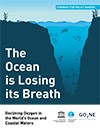One Planet, One Ocean
Conserving the diversity of life on Earth and ocean health is critical to global human welfare, yet essential resources are at risk from the direct results of unsustainable practices. Sustainable development cannot be achieved by technological solutions, political regulation or financial instruments alone. We need to change the way we think and act.
UNESCO's Intergovernmental Oceanographic Commission (IOC-UNESCO) strives to promote intergovernmental cooperation in order to generate knowledge about the nature and resources of the ocean and coastal areas and to apply that knowledge to management, sustainable development, marine environment protection, and decision-making processes within its Member States. The Commission also seeks to improve society’s relationship with the ocean through the development and dissemination of scientific knowledge and by educating the general public on how to respond effectively to the unprecedented environmental changes and human activities now impacting the world’s ocean.
Global environmental change has profound social and human dimensions. Over 30 UNESCO programmes in ocean and natural sciences, education, culture and communication contribute to creating knowledge, educating and communicating about climate change, and to understanding the ethical implications for present and future generations.
Sustainable development requires quality education and learning at all levels and in all social contexts. Education for Sustainable Development (ESD) is about enabling us to constructively and creatively address present and future global challenges and create more sustainable and resilient societies. UNESCO has been recognized globally as the lead agency for ESD. It coordinates the implementation of the Global Action Programme (GAP) on ESD, as official follow-up to the United Nations Decade of ESD (2005-2014).
With the support of the World Heritage Convention, the most important natural sites receive international recognition as well as technical and financial assistance to deal with threats such as agricultural encroachment, alien species and poaching.
As part of its worldwide efforts to safeguard our common cultural heritage in its diverse forms, UNESCO adopted the Convention on the Protection of the Underwater Cultural Heritage in 2001. This international treaty sets out ethic principles for the protection of submerged heritage, provides a detailed state cooperation system, and practical scientific rules for the treatment and research of this heritage.









